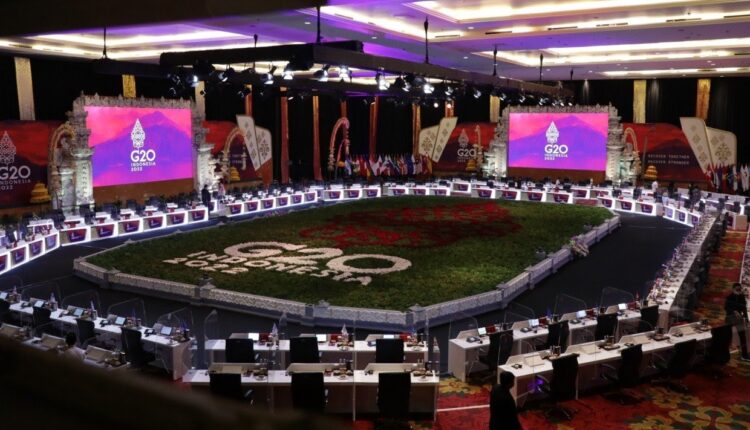G20 Presidency Strengthens Global Food Mitigation Collaboration
By: Sinta Amalia )*
Ministers of Finance and Ministers of Agriculture of G20 member countries stated that they are ready to mitigate risks to global food insecurity through the G20 Presidency of Indonesia 2022. At the G20 Joint Finance and Agriculture Ministers Meeting (JFAMM) in Washington DC, the United States Minister of Finance, Sri Mulyani Indrawati provided a commitment as a an important foundation for strengthening coordination and responding to challenges in food security issues, including Indonesia which will firmly use all appropriate policy tools in overcoming economic and financial challenges including the risk of food insecurity.
As it is known that this food scarcity condition is experienced by most countries in the world caused by the impact of climate change, natural and environmental disasters, the Covid19 pandemic, and social conflicts including the result of the Russian-Ukrainian invasion. This food crisis has the potential to disrupt the stability of a country. The impact of food scarcity that is felt directly is hunger, increasing poverty rates, and lack of nutrition in the younger generation so that they cannot grow optimally.
Not only as an economic commodity, food is a commodity that has social and political functions both nationally and globally. For this reason, food security has a significant influence on the sustainability of a country.
Currently, there are 22 countries that have stopped the export of various types of food to secure domestic needs in the midst of world geopolitical tensions. In 2022, the overall food price increase will increase by about 33%. This condition affects the pattern of world trade, stability of food prices and global food supply, including Indonesia. Moreover, many business actors, especially MSMEs in Indonesia, use food as raw material for production.
Through the JFAMM meeting, G20 member countries are ready to take rapid collective action to strengthen food and nutrition security by collaborating between countries in mitigating risks from the global food crisis. G20 member countries also support increased coordination to ensure a harmonized global response to food insecurity, and agreed to delegate tasks to the Food and Agriculture Organization (FAO) and the World Bank in mapping global policy responses to food insecurity.
The World Bank has committed to provide USD 30 million in project finance related to food security and nutrition over the next several years. FAO also provides the development of food market conditions in order to achieve efficiency. The Government of Indonesia is also trying to maintain the availability of the food supply chain through the support of the State Revenue and Expenditure Budget (APBN) with an indicative ceiling value of the Ministry of Agriculture in 2023 allocated Rp6.76 trillion for the Quality Food Availability, Access and Consumption Program and Rp1.78 trillion for the Food Quality Program. Added Value and Industry Competitiveness. The indicative ceiling value will be directed to achieve the national development priority targets in the field of food security.
The Indonesian Minister of Agriculture, Syahrul Yasin Limpo invited all G20 member countries to build active collaboration in global food mitigation which currently threatens many countries in the world. During the meeting, Syahrul Yasin Limpo conveyed 3 main issues that must be prioritized at this time, namely promoting a strong and sustainable agricultural and food system, promoting open, fair and transparent agricultural trade, and promoting entrepreneurship in the agricultural sector which is innovative for digital agriculture. This is part of an effort to improve the lives of farmers in rural areas.
These three issues are interrelated with each other so that they become a major concern for all countries in the world to realize sustainable development in the agricultural sector and ensure the availability and affordability of food evenly for all. In essence, the food crisis in 2023 must be anticipated properly by opening a strong line of cooperation between countries in order to be free from the pressure of the global food crisis.
He continued, food supply is a common need that should not be limited by any interests because it is closely related to humanity (human rights) and the availability of distribution, access and affordability of food must be handled together. Syahrul Yasin Limpo also considered that the JFAMM meeting was very important because it discussed the country’s readiness to anticipate and face the world food crisis by implementing several strategies that were considered effective in increasing the main production capacity of food commodities that had an impact on inflation in order to stabilize food prices, suppress inflation, reduce imports, and increasing food exports. This strategy is applied to several strategic food commodities to overcome problems that arise in the food agribusiness system in order to achieve efficiency and increase competitiveness.
On the same occasion, the Minister of Finance, Sri Mulyani Indrawati, also supported Syahrul Yasin Limpo’s efforts in strengthening food security and increasing the scale of national production. According to him, food is an important sector that cannot be separated because of various threats from the world crisis. Each country must also always be prepared to continue to provide food and nutrition for all and ensure food security in an equitable manner.
Various solutions and initiatives in overcoming global food security problems resulting from the G20 Presidency of Indonesia 2022 will continue to be implemented until the next G20 Presidency in 2023 under the leadership of India.
)* The author is an Agricultural Observer from Gadjah Mada University
